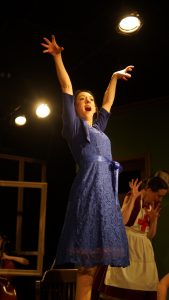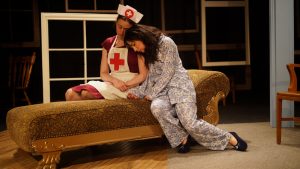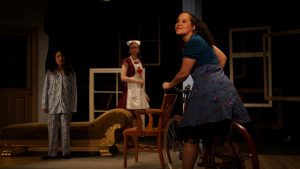PRECIOUS NONSENSE MAKES
MELANCHOLY PLAY A FORTRESS OF ARTIFICE
If you ever feel “slightly dead,” you may be prey to the temperament of melancholy. Melancholy Play: A Contemporary Farce, a 2002 drama by the prolific and unpredictable Sarah Ruhl, treats the condition with singular intensity, delivering a histrionic polemic on the virtues and perils of the ailment. In Laura Sturm’s unavoidably overwrought and stylized staging for Organic Theater Company, this silly stuff is both delightful and enervating, much like its subject.
Ruhl’s 140-minute trifle, set in Normal (!), Illinois, focuses on bank clerk Tilly (Alys Dickerson, firing on all cylinders): Her chronic melancholy acts like a pheromone on everyone around her. For Ruhl, melancholy is not at all like depression, which isolates and paralyzes its victim. It’s that dreamy, yearning feeling you get from afternoon rain or the thought of mortality. It’s active, nostalgic, even hopeful and sexy.
It certainly is for sweetly sad Tilly. Everyone falls in love with her: her vaguely Italian shrink Lorenzo (Martin Diaz-Valdes), a complexly conflicted orphan; her tailor boyfriend Frank (Kris Downing), who loves being touched; her stylist Frances (Rachael Soglin), mired in her miseries; and Frances’s gruff lover, British nurse Joan (Stephanie Sullivan). The only untouched character is Julian (Michaela Voit), the cellist who performs an uncredited and, yes, melancholy accompaniment.
 Lyrical loners, Tilly’s romantic conquests regularly lurch into apostrophes to the audience, and also render two peppy choral anthems detailing their dotage on her despair. (Love, music, and food, it seems, are both causes and cures for melancholy, creating either a dangerous stasis or passionate stand-off.) Over and over, these emotionally vulnerable dupes fall under Tilly’s tender spell, revolving moons to Tilly’s pathetic planet.
Lyrical loners, Tilly’s romantic conquests regularly lurch into apostrophes to the audience, and also render two peppy choral anthems detailing their dotage on her despair. (Love, music, and food, it seems, are both causes and cures for melancholy, creating either a dangerous stasis or passionate stand-off.) Over and over, these emotionally vulnerable dupes fall under Tilly’s tender spell, revolving moons to Tilly’s pathetic planet.
But, half way through, Tilly suddenly discovers on her birthday that she’s “happy.” The former maudlin maiden is now blithely euphoric — and her four fans, for whom her jubilation is a killjoy, hate it. Suffering dry mouth, losing her sense of smell, and lacking the sustenance of sorrow, Frances drinks a vial of Tilly’s tears and shrinks into an almond. Apparently, the human-to-almond transformation is spreading like Ionesco’s fascist rhinoceros. (This nut is in fact Ruhl’s coy metaphor for the brain’s amygdala — which is both the Greek word of “almond” and an organ that processes emotion.)
No barebones synopsis, however, can convey the creepy feel of this quirky two-act. Toxically melodramatic and ultimately cloying, these five very presentational performers are as mannered as the material, making it Olympianly difficult to take this arch folderol seriously.
It doesn’t help that Ruhl’s dialogue — flamboyant, indulgent, breathless, and pseudo-rhapsodic — is packed with tedious non sequiturs, contrived one-liners, and a penchant for pathos that somehow manages to both go off the deep end and still stay shallow.
But the biggest problem is that Ruhl’s anatomy of melancholy is mainly misleading: The “melancholic” and mournful qualities that Ruhl attributes to Tilly are really an amalgam of neurasthenia and hypochondria. It’s more self-pity than sentiment and more common to drama queens than dreamers. And too soon it’s too tiresome.
The title should really be Manic Depression Play. And that would explain her wrenching mood swing in the second act. The overkill aside, some plays are just too wacky and whimsical for their own good. Self-medicating in the worst way, this one’s enough to make you melancholy.
photos by Anna Gelman
Melancholy Play
Organic Theater Company
Greenhouse Theater Center, 2257 North Lincoln Ave.
Wed-Sat at 7:30; Sun at 2
ends on April 14, 2019
for tickets, call 773.404.7366 or visit Organic Theater








